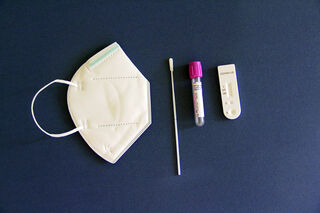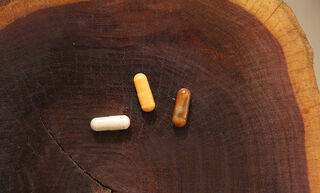Coronavirus Disease 2019
Why Some People Spiral With Covid-19
How to determine your risk and help ease fear during the pandemic.
Posted August 11, 2020 Reviewed by Kaja Perina
Over the majority of this past year, the world has been devastated by the impact of COVID-19. And yet, there has been very little coverage of the genetic factors that play a vital role in the immune response.
A hyperactive immune response is now accepted as the culprit in severe lung and organ complications seen with COVID-19. Through medical genetic screening carried out by trained physicians, we now have the power to uncover an individual’s unique health strengths and risk factors so that we can make informed decisions surrounding our health and take the proper precautions. Knowing our DNA may help us in preventing and successfully managing such an infection through lifestyle and supplementation, controlling the expression of such genes. In order to avoid living in chronic fear or uncertainty, perhaps it's time to invest in understanding ourselves.
The overactive immune system response to viruses is what leads to the worst outcomes as seen in SARS-Cov-1– which is very similar. This over reaction is referred to as the 'cytokine storm', which causes damage to organ tissue and leads to severe and even fatal complications. Genetic studies of the original SARS virus discovered this. As our immune system attacks viral particles, it also attacks the tissue in which the virus hides– predominantly the lungs, kidneys, and heart. One prominent example of this is the need for ventilator support in those with severe complications from COVID-19.

Imagine how incredible it would be to know whether or not you're predisposed to such a response based on a simple saliva test and knowing that you could actually do so something about it. Let's examine some genes that predispose us to having a heightened immune reaction to COVID-19, and what currently exists that may help prevent us harm from it:
NLRP3: This gene is part of something called the inflammasome, and as you may be able to guess, it is responsible for kickstarting the cascade of inflammation by our immune system. There is evidence that both COVID-19 and SARS activate this inflammasome. In particular, those with specific gene variants of NLRP3 may experience an over-expression of immune function that can lead to worse lung injury and can even imperil survival. A supplement class known as Resolvins may prove to be a tremendously helpful treatment option in those with such complications, as they halt the inflammasome cascade. Imagine being armed with this knowledge while having access to a nutraceutical that could potentially help you when you need it most.
TNF alpha: TNF alpha is an important pro-inflammatory protein that responds to infectious threats that enter our bodies, this helps mount a very large immune response, even mediating the inflammasome itself. Having one particular variant of this gene has been associated with significantly higher adverse outcomes in people with SARS due to a greater inflammatory response. In fact, a gene variant of TNF alpha has been shown to cause a near nine-fold increase of death in critically ill people. TNF alpha has even been shown to result in some neuro-psychiatric conditions which we are starting to see with COVID-19 patients. Fortunately, there is great news in the pipeline, accumulating evidence is in support of Lions Mane (Hericium Erinaceus) a supplement that has shown tremendous promise in lowering TNF alpha. While more studies are needed to clarify its degree of impact, it's impressive to know that there may be an option that can help lower the inflammation cascade and even possibly be an adjuvant to help save lives from the 'cytokine storm'.
CCL2: This gene codes for a cytokine signal that helps immune cells migrate towards sites of inflammation. Having a certain genetic variant (as does 8% of the population), is correlated with a 58% increase in representation among SARS patients; in these cases, their immune systems overreact. These variants have already been associated with lung and other organ damage. Ashwagandha, also known as an adaptogen, has been shown to work on attenuating this pathway and may help limit the extent of the cytokine storm. For those of us who carry this gene, use of this nutraceutical may provide a potential aid in the early fight against COVID-19, and with few adverse effects.

Simply knowing where you stand in the fight against over-inflammation may allow you to arm yourself and take control of your health in a proactive way, rather than succumb to it and the fear surrounding it. A simple at home saliva test kit is all that is needed to initiate the process. A physician trained in Clinical Genomics may help order this and interpret your genes involved in the inflammatory pathway providing you the advice you need. Combining a well-rounded knowledge of your own genetic makeup and a clean nutrient-dense diet (as the CDC has recently begun advising) can provide you some peace of mind.
As we continue to dive deep into the world of genetic and personalized medicine, we can expect to see even more tailored medical approaches to these issues. As a functional and integrative medicine-certified physician, helping empower those in their path to optimal health and prevention of diseases, including COVID-19, is the ultimate mission.
References
Neilson S. The surgical mask is a bad fit for risk reduction. CMAJ. 2016;188(8):606-607.
Genomic characterisation and epidemiology of 2019 novel coronavirus: implications for virus origins and receptor binding. Lu, Roujian et al. The Lancet, Volume 395, Issue 10224, 565 - 574
Severe COVID-19: NLRP3 Inflammasome Dysregulated. Daan F. van den Berg and Anje A. te Velde. Frontiers in Immunology, Volume 11, 2020
Lawson COVID-19 Study Team Inflammation Profiling of Critically Ill Coronavirus Disease 2019 Patients, Critical Care Explorations. APA Fraser, Douglas D. MD, PhD; Cepinskas, Gediminas DVM, PhD, 3; Slessarev, Marat MD June 2020 - Volume 2 - Issue 6 - p e0144
Chang HC, Yang HL, Pan JH, et al. Hericium erinaceus Inhibits TNF-α-Induced Angiogenesis and ROS Generation through Suppression of MMP-9/NF-κB Signaling and Activation of Nrf2-Mediated Antioxidant Genes in Human EA.hy926 Endothelial Cells. Oxid Med Cell Longev. 2016;2016:8257238.
Song P, Li W, Xie J, Hou Y, You C. Cytokine storm induced by SARS-CoV-2 [published online ahead of print, 2020 Jun 10]. Clin Chim Acta. 2020;509:280-287. doi:10.1016/j.cca.2020.06.017
Grunz-Borgmann, E., Mossine, V., Fritsche, K. et al. Ashwagandha attenuates TNF-α- and LPS-induced NF-κB activation and CCL2 and CCL5 gene expression in NRK-52E cells. BMC Complement Altern Med 15, 434 (2015)


